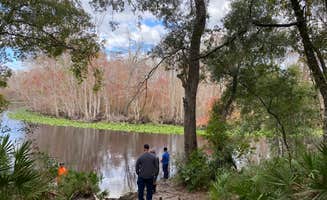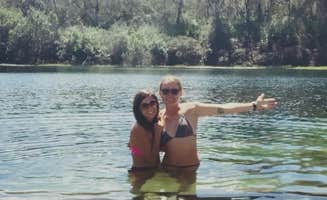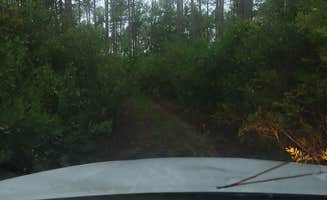Dispersed camping options near Welaka, Florida are concentrated in the Ocala National Forest, where sandy soil and subtropical conditions create a unique camping environment. These sites experience hot, humid summers with temperatures regularly exceeding 90°F and mild winters with occasional frost. The forest's terrain includes pine flatwoods, sand pine scrub, and wetland ecosystems which support diverse plant and animal species across 383,000 acres.
What to do
Paddling access: At St. Johns River Dispersed Spot, campers can launch kayaks directly from camp. "Right next to the river and the trees open up so you get a great view of the stars," notes camper Mike D. The spot provides convenient water access for fishing, paddling, and stargazing.
Swimming holes: Freak Creek Dispersed Camping offers natural swimming areas during warmer months. According to camper Hilary G., "There is a nice creek area where you can swim and or fish if you have the right equipment to get back there it can be fun." The creek provides relief from Florida's heat with cooler waters.
Wildlife observation: The forest hosts numerous bird species, deer, and aquatic wildlife. Bring binoculars for spotting animals at dawn and dusk when they're most active. Campers should maintain appropriate distances from wildlife and store food properly to prevent attracting animals to campsites.
What campers like
Seclusion: Many dispersed sites offer genuine isolation from crowds and development. At Freak Creek Dispersed Camping, Adamm A. reports, "It's super secluded and quiet. Depending when you stay there's at times people who show up to party and then leave." The remote location limits visitor numbers.
Water features: Blue Sink provides access to natural water features unique to Florida's karst topography. Camper Destiny R. describes it as the "Most beautiful place to stumble upon," though reaching it requires effort as "The Forestry Service recently chopped down trees and covered the easy access roads."
Night skies: Several sites feature minimal light pollution, creating opportunities for astronomy. The forest's relatively flat terrain and clearings around water bodies provide good visibility for constellation viewing and astrophotography without specialized equipment.
What you should know
Vehicle requirements: Many sites demand high-clearance or 4WD vehicles. At Trout Lake Primitive Sites, a reviewer notes: "Main road entry is packed dirt; smaller access road to sites is two-track about 1/4 mile through woods — very narrow tree clearance. 4WD recommended." Vehicle damage is common on unmaintained forest roads.
Limited communications: Cell service remains unreliable throughout the forest. "Poor cell service even with booster. Plan on returning after antenna upgrade," reports a camper at Trout Lake Primitive Sites. Prepare for emergencies by bringing physical maps and telling someone your plans.
Occupancy variations: Dispersed sites sometimes attract long-term users. At Davenport Landing, camper Dylan D. observed: "Really nice area unfortunately there's a homeless commune. We set up camp earlier in the day when there was only a few people hanging out wasn't until a few hours later when I realized that they were living there."
Tips for camping with families
Site selection: Choose camps with easier access when traveling with children. Davenport Landing offers more navigable roads than remote sites. David P. notes, "Last 100 yards driving back in were very bumpy but no problem with our van. Not sure about a larger RV. But great Tent/van spot."
Safety considerations: Prepare for encounters with insects and wildlife. Pack appropriate repellents, closed-toe shoes, and first aid supplies. Know basic snake and spider identification for the region.
Activities: Bring entertainment that doesn't require electricity or internet. Card games, field guides for plant/animal identification, and nature scavenger hunts work well in this environment where digital diversions aren't available.
Tips from RVers
Vehicle width: Forest roads often have vegetation encroachment that can damage larger vehicles. Joe P. at Trout Lake Primitive Sites warns, "Very narrow trails but really easy access, you will leave with some new pinstripes." Measure your vehicle width against trail specifications before attempting access.
Ground conditions: Free camping near Welaka, Florida requires awareness of seasonal soil stability. Sandy areas become problematic after rain. One reviewer at Trout Lake barely "scraped a FWD Promaster through the trees, into a pullout just before sand started." Carry recovery equipment including traction boards and a shovel.
Supply planning: No amenities exist at these sites, requiring complete self-sufficiency. Bring sufficient drinking water (1 gallon per person per day), waste disposal bags, and all necessary supplies as the nearest stores may be 30+ minutes away.




